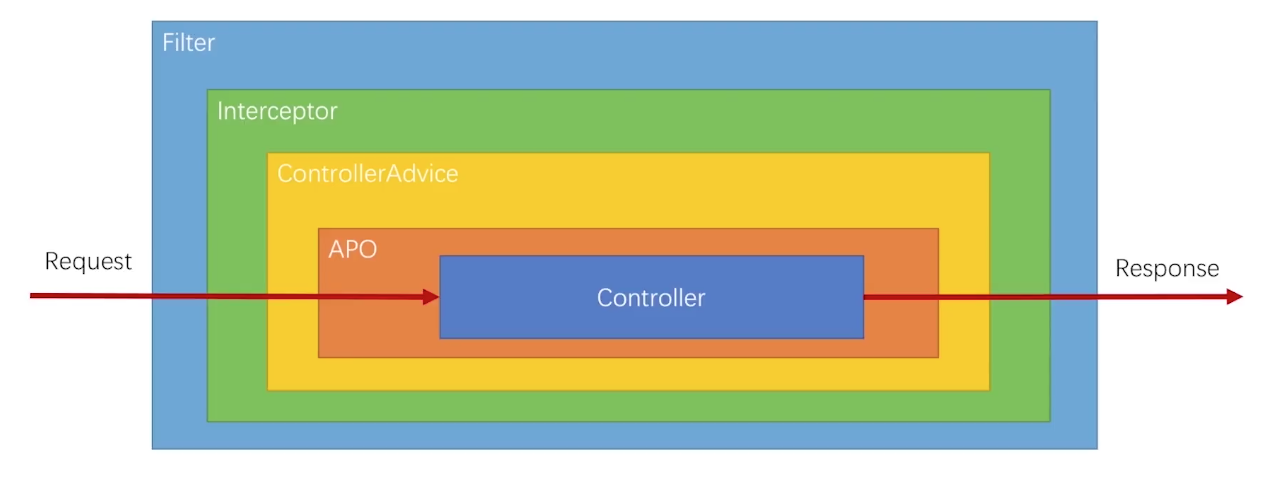Series Length
- 1. Spring - IOC - Register Components
- 2. spring - IOC - Dependent Injection
- 3. Spring - IOC - Component Scan Rules
- 4. Spring - IOC - Component Scope, Lazy Loading, Conditional Judgment
- 5. Spring - IOC - Lifecycle of Components
- 6. Spring - AOP - Basic Use
Preface
This article will sort out AOP related knowledge, not directly introduce the theory here, let's see how to use it in our daily work
Relationship among Filter, Interceptor, ControllerAdvice, AOP

Process description
- Join dependent spring-aspects
- Add both business logic components and facet classes to the container and facet classes to the annotation @Aspect
- Label a notification annotation on each notification method on the facet class to tell Spring when and where to run the entry point expression
- Turn on annotation-based aop mode@EnableAspectJAutoProxy
| Notification Method | Explain |
|---|---|
| Pre-notification (@Before) | Run before the target method runs |
| Post Notification (@After) | Run after normal/abnormal end of target method |
| Return notification (@AfterReturning) | Run after the target method returns normally |
| Exception notification (@AfterThrowing) | Run after the target method has an exception |
| Wrap Notification (@Around) | Dynamic proxy to manually push the target method to run joinPoint.procced() |
Introducing dependencies
Lombok recommends: [Use of Lombok] (.../.../Java/programming skills/use of Lombok.md)
<!-- lombok Personal habits are not necessary --> <dependency> <groupId>org.projectlombok</groupId> <artifactId>lombok</artifactId> <version>1.18.10</version> </dependency> <dependency> <groupId>org.springframework</groupId> <artifactId>spring-context</artifactId> <version>4.3.12.RELEASE</version> </dependency> <!-- aop Faces must be imported --> <dependency> <groupId>org.springframework</groupId> <artifactId>spring-aspects</artifactId> <version>4.3.12.RELEASE</version> </dependency>
Description of Common Methods
JoinPoint parameter must be first
Called before a class method executes
@After("execution(public int com.xm.demo.MathCalculator.*(..))") public void logEnd(JoinPoint joinPoint){ String methodName = joinPoint.getSignature().getName(); System.out.printf("Method:%s End, Face Class: logEnd Method", methodName); }
Pull out the common expression of the cut surface for easy reading and encapsulation
@Pointcut("execution(public int com.xm.demo.MathCalculator.*(..))") public void pointCut() { } /** * Common cut-in expressions for this class */ @Before("pointCut()") public void logStart(JoinPoint joinPoint) { Object[] args = joinPoint.getArgs(); String methodName = joinPoint.getSignature().getName(); System.out.printf("Method:%s About to run, parameter list:%s,Face class: logStart Method", methodName, Arrays.asList(args)); } /** * Common cut-in expressions for other classes */ @After("com.xm.demo.LogAspects.pointCut()") public void logEnd(JoinPoint joinPoint) { String methodName = joinPoint.getSignature().getName(); System.out.printf("Method:%s End, Face Class: logEnd Method", methodName); }
Complete example
Define function class, wait for slice log
public class MathCalculator { public int div(int i, int j) { System.out.printf("Method: MathCalculator.div(%d,%d)\n", i, j); return i / j; } }
Define Face Class @Aspect must be added or invalid
@Aspect public class LogAspects { /** * Extracting common entry point expressions */ @Pointcut("execution(public int com.xm.demo.MathCalculator.*(..))") public void pointCut() { } @Before("pointCut()") public void logStart(JoinPoint joinPoint) { Object[] args = joinPoint.getArgs(); String methodName = joinPoint.getSignature().getName(); System.out.printf("Method:%s About to run, parameter list:%s,Face class: logStart Method\n", methodName, Arrays.asList(args)); } @After("com.xm.demo.LogAspects.pointCut()") public void logEnd(JoinPoint joinPoint) { String methodName = joinPoint.getSignature().getName(); System.out.printf("Method:%s End, Face Class: logEnd Method\n", methodName); } @AfterReturning(value = "pointCut()", returning = "result") public void logReturn(JoinPoint joinPoint, Object result) { String methodName = joinPoint.getSignature().getName(); System.out.printf("Method:%s Normal return,Return results:%s,Face class: logReturn Method\n", methodName, result); } @AfterThrowing(value = "pointCut()", throwing = "exception") public void logException(JoinPoint joinPoint, Exception exception) { String methodName = joinPoint.getSignature().getName(); System.out.printf("Method:%s abnormal,exception: %s,Face class: logException Method\n", methodName, exception); } }
Configuration class @EnableAspectJAutoProxy must be added or invalid
@EnableAspectJAutoProxy @Configuration public class MainConfig { /** * Business logic classes are added to containers */ @Bean public MathCalculator mathCalculator(){ return new MathCalculator(); } /** * Cutting class added to container */ @Bean public LogAspects logAspects(){ return new LogAspects(); } }
Use
public class MainTest { public static void main(String[] args) { AnnotationConfigApplicationContext context = new AnnotationConfigApplicationContext(MainConfig.class); // Cutting is invalid if the ioc container is not practical MathCalculator calculator = context.getBean(MathCalculator.class); int div = calculator.div(4, 2); System.out.printf("result: %d", div); } }
Normal results
Method: div is about to run, parameter list: [4, 2], tangent class: logStart method Method: MathCalculator.div(4,2) Method: div end, tangent class: logEnd method Method: div returns normally, result: 2, tangent class: logReturn method result: 2
Failure Result
Method: div is about to run, parameter list: [1, 0], tangent class: logStart method Method: MathCalculator.div(1,0) Method: div end, tangent class: logEnd method Method: div exception, exception: java.lang.ArithmeticException: / by zero, tangent class: logException method
182 original articles published. 33% praised. 250,000 visits+

